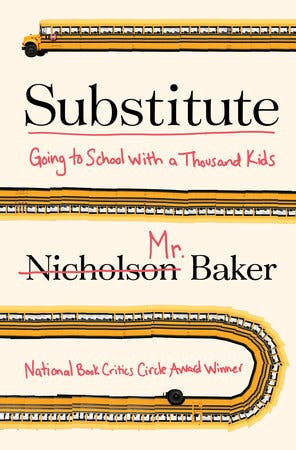Watching a calm classroom is usually intolerable. Think of Ben Stein playing an economics teacher in Ferris Bueller’s Day Off: His character is an icon of protracted boredom, but Stein’s performance is, in its entirety, shorter than two minutes long. Representing class-time at anything like its real scale (around 1200 hours a year, for over a decade per student) is impossible. Nicholson Baker’s book Substitute is an exception to the rule, and a big one at that. With 700 pages set in the classroom, Substitute doesn’t flinch.

Baker is an acclaimed postmodern stream-of-consciousness novelist as well as an award-winning nonfiction writer, the author of Vox, and U and I. Toward the end of the 2014 school year, he became a substitute teacher in the Maine public K-12 system. Substitute is his extremely detailed account of 28 days in a teacher’s shoes, and the school day as it’s actually experienced is good terrain for his exhaustive style. The scale works out to something like this: Baker spent 224 hours as a sub, and produced 719 pages. At about a minute per page, that’s 12 hours of material, which means Substitute moves through 28 days of school at 20x speed. That may sound fast, but it’s the slowest, most deliberate reproduction of the classroom experience I’ve ever seen.
A lot of people imagine that they would make good teachers, and some of them are right. No doubt it’s a smaller number than would make good substitute teachers for a couple months. It’s unclear what kind of teacher Baker would make, but based on Substitute he’s a pretty good sub. He identifies more with the students than the instructors and classroom aides he’s replacing, and that makes him a sympathetic presence, at least in his own telling. Maintaining classroom discipline is not high on his list of priorities, and Baker is surprised at the level of control he’s expected to exercise. “How could they do it?” he wonders on day 15, “How could these teachers spend all day saying ‘GUYS,’ month after month? How do they have the stamina?” He feels for the teachers, but he also doesn’t hold a very high opinion of what they do on a day-to-day basis.
As a sub, Baker doesn’t bear responsibility for imparting much wisdom to his students. His job is more or less to keep everyone alive and avoid riots. This means he doesn’t have to defend assignments and curriculum decisions, which is good because he often finds them indefensible. As eighth-graders are forced to dissect classic short stories for their conflicts and themes in a way Baker finds grotesque, he struggles with making them do the pointless work:
‘I like talking to people … but getting you guys to actually finish an assignment is a whole different thing. Because you don’t want to do it. I and I don’t-’ I stopped. I didn’t want to say that I really didn’t care whether they wrote the conflict essay or not—that I didn’t think doing it would improve their writing one bit—because that wouldn’t make life any easier for them.
All he can do is not be a dick about it and always leave a note for their real teacher saying everyone did a good job.
Being a substitute is, in some ways, an ideal place from which to observe the classroom. When he’s subbing for older kids, they generally have assignments to catch up on and he can watch. Elementary schoolers are so attached to their routines that they’ll tell Baker exactly how things are supposed to work. And since he hasn’t been in a classroom in a long time, Baker experiences 21st-century public education for us through fresh eyes. He is often left incredulous. After day eight, he inventories a heavy day at high school to himself: “Antebellum reform, suicide, Hitler Youth, more antebellum reform, and amateur genetics, all in six and a half hours. ‘What the fuck.’” And though the students are doing a lot of work, they don’t seem to be learning much.
Baker is often frustrated with the material he’s asked to push on students, and this reaches its peak with a graphic Holocaust documentary called Auschwitz: Death Camp starring Oprah and Elie Wiesel that he shows to successive 10th-grade English classes. Watching piles of bodies, Baker thinks,
I knew that this was the wrong documentary to be showing to a group of choiceless, voiceless high school kids at eight-thirty on a Monday morning, in connection with a compare-and-contrast media-studies assignment … These high schoolers were being tortured to the point of numbness and indifference by gruesome imagery—and the Holocaust was being trivialized through inattention, both at the same time. Why was this happening? Why was I a part of this?
By the end of the video two girls are doing a cheerleader-style H-O-L-O-C-A-U-S-T! chant, and Baker doesn’t know whom to blame.
Classroom technology has changed a lot since Baker last visited—even since I did—and having a substitute isn’t the break for students it used to be if their daily progress is watched by a school iPad. Some teachers take a curatorial approach, delegating a large portion of their pedagogy to instructional apps, Youtube videos, and downloaded worksheets. On day nine Baker hears two teachers discussing iPad assignments when they have subs, “You delete them without reading them?” one asks. “Yes,” the other says, “They don’t do anything anyway.” The iPads themselves are wont to delete the occasional assignment. Students are encouraged to take screenshots to verify their work in the event of technical malfunction.
Baker is skeptical of the iPads, and from talking to the kids, it seems their central purpose isn’t to speed up learning. Filtering a student’s engagement through the device gives teachers a lot of leverage. An eighth-grader named Rodney explains: “If you’re over five missing assignments you get your iPad locked up. You can’t buy apps, you can’t play games.” He tells Baker that he has gone from 50 down to 25 assignments back due. It’s a pattern Baker sees repeated, and the iPad’s main function seems to be preparing adolescents to be constantly in debt.
Most of the book is descriptions of classroom scenes and conversations Baker has with the kids. There aren’t a lot of inspiring moments, and the actual educational content is mostly beside the point. Schools are more interested in producing the right behavior and students who make the right choices within their weird technosocial reward-control system. A lot of time is spent making kids memorize Latinate terminology. If we want them to learn memory techniques and Latin, why not just teach memory techniques and Latin?
Baker is particularly frustrated when students are asked to classify immigration in terms of “push” and “pull” factors. “As I explained it over and over,” he writes, “it started to seem like a confusingly pseudo-scientific term for something that was self-evident.” On a number of occasions students are given straight-up misinformation, sometimes by Baker: Britain and France defeated Hitler, Nuclear power presents no ecological threat, America is the only country to have banned alcohol, the ability to roll your tongue is called “geographic tongue.”
Other times students are asked to read the teacher’s mind in some faux-Socratic waste of time. In one scene, a reading specialist is trying to explain the idea of bolded words to kindergarteners. “Why do you think [the author] put teamwork in blue?” The question is extremely ambiguous, and they’re confused. She could be asking what makes the word teamwork important or (what she’s going for) why a writer might single out a word with a different color. Instead of telling kids how to spell words when they ask, she makes them spell phonetically, which results in uninterpretable gobbledygook and frustration.
The saddest moment in the book for me is when Baker asks a seventh-grade class (rhetorically) why fingers prune in water. A girl named Jade says it’s to increase grip, that she read it somewhere. “I don’t believe that,” Baker says. He goes with the answer on the trivia card, which simply describes the biological mechanism for pruning. But Jade could have read about gripping in the journal Nature, which first suggested it as an evolutionary basis for finger-pruning in 2013, likely after the trivia cards were printed. Baker could have Googled it in the time it took him to tell Jade that she was wrong twice. It’s a brief moment for Baker, but that’s the kind of thing that can stick with a kid.
The closest thing to an education reform proposal Baker comes up with is to let kids leave after lunch. Students know that, no matter how fast they tackle the curriculum, they have to come to class until summer break. Beyond grades and discipline, kids have very little incentive to focus on learning, and therefore much of the curriculum is centered on getting them to focus.
Trying to explain a principle (one he thinks is stupid), Baker asks an eighth-grade English class, “Guys, when you woke up this morning, what was the conflict in your life?”
